Newspaper headlines: UK death toll Europe's worst, and adviser quits
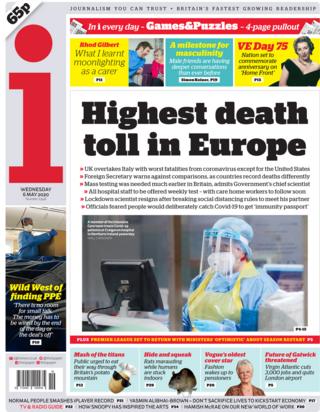

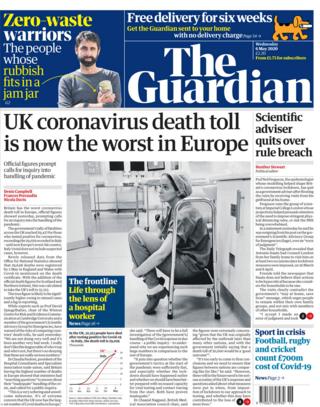

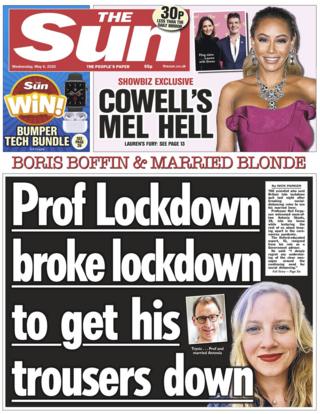
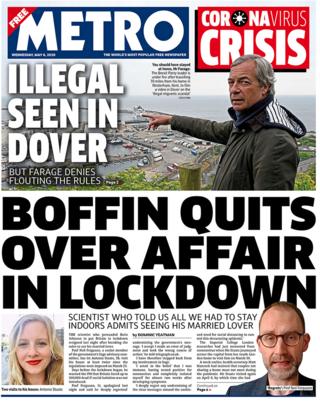
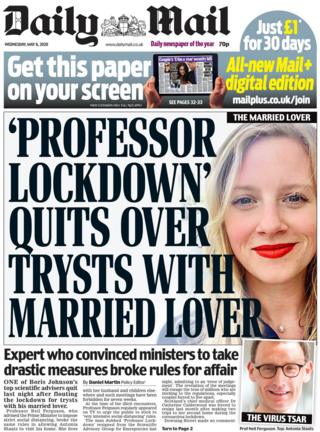
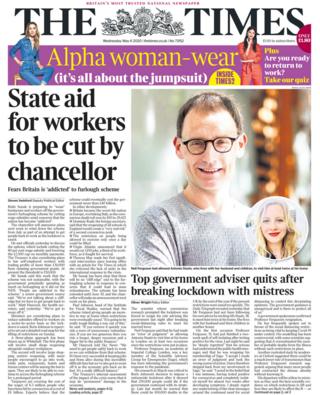


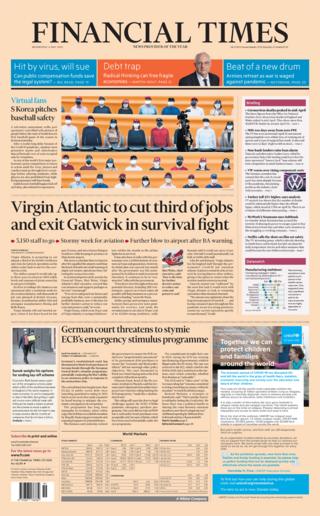
The news that more people with Covid-19 have died in Britain than in any other European country makes the front of several newspapers.
"From bad to worst," is the headline in the Daily Mirror, which says ministers are facing "serious questions" about their strategy for handling the crisis.
"Those who have lost loved ones have a right to know why the UK has the highest death toll in Europe," says its opinion column.
That theme is picked up on the front page of the Guardian, which quotes the president of the Hospital Consultants and Specialists Association, calling for a public inquiry into the government's response.
But a representative of another union, the British Medical Association, tells the paper that it is too early to come to conclusions, and care has to be taken with the figures to ensure nations are comparing "like for like".
The i newspaper, which leads on the same story, describes it as a "sobering moment", especially after Prime Minister Boris Johnson referred last week to Britain's "apparent success" in fighting Covid-19.
It suggests that phrase jarred with many of its readers and expresses hope that ministers are "learning fast" how to adapt their policies.
"UK is sickest man in Europe", is the headline in the Daily Mail, which describes the revelation as "one of the darkest days of the coronavirus pandemic".
The paper considers why Britain compares so badly with other countries. Possible explanations, it suggests, include the length of time taken to impose the lockdown, the comparatively high population density in parts of the UK, and the failure to quickly "ramp up" testing, in the way that Germany and Italy did.
Leading scientist quits
The resignation of the government's scientific adviser, Prof Neil Ferguson, is on most of the front pages.
The headline in the Daily Telegraph, which broke the story, is: "Lockdown professor steps down after breaking rules to meet married lover".
The former Conservative leader, Sir Iain Duncan Smith, is quoted as saying: "Surely it is a case of we have been doing as he says and he has been doing as he wants."
Sir Iain believes that could undermine the government's message. But another senior Tory, Sir Charles Walker, points out that people will be "desperately missing" those that they love. "I totally understand if that separation becomes too much to bear," he says.
The Daily Mail's take on the story is "Professor Lockdown quits over trysts with married lover" while the Sun's headline is: "Prof Lockdown broke lockdown to get his trousers down".
The Times expresses dismay about a warning within its own pages from the former Prime Minister Theresa May.
She argues that countries around the world should be uniting to tackle the coronavirus, but instead the outbreak is fuelling what she calls a "shift towards nationalism and absolutism".
The Times' leader column states that "if countries fall out with their neighbours or obstruct international funding efforts, everyone stands to lose out". And it also points out that if there's global collaboration on vaccine testing, progress will be faster.
The idea that the outbreak is putting a wedge between countries also preoccupies the Financial Times.
It reports that Germany's constitutional court has threatened to block fresh purchases of the country's bonds, which the European Central Bank has been buying as it seeks to bolster the EU's economic response to the crisis.
The FT calls the German move "misguided", suggesting it could jeopardise investment and job creation across the Eurozone.
Meanwhile, the Daily Telegraph's leader asks: "Is the government refusing to bail out airlines because it thinks they have no future?"
The paper says Covid-19 has "wrecked" the business models of the entire industry but ministers have resisted pressure to intervene. It suggests that's a mistake, saying that "if these companies go under, the wider impact will be enormous".
"How dare China spy on our virus labs?" asks the Daily Express.
It alleges that "cyber criminal gangs" backed by Beijing have - according to unnamed security sources - been targeting the British drug companies trying to develop a vaccine for Covid-19.
The paper says it's been told that Russia and Iran have also been linked to such attempts by hackers and that more attacks are expected in the coming weeks.
Get news from the BBC in your inbox, each weekday morning
With the BBC spy thriller Killing Eve back on television, the Times reports that the "gruesome and fantastical" murders carried out by one of its central characters - the assassin, Villanelle - are actually based on real cases.
The paper explains that the BBC's security correspondent, Gordon Corera, was asked to draw up a list of unusual execution methods.
The use of a poisoned perfume, says the Times, was inspired by the killing in 2017 of Kim Jong-Nam, the half-brother of the North Korean leader, Kim Jong-Un. He had nerve agent smeared on his face by two women who believed they were appearing in a prank TV show.
And finally, the Guardian reports that researchers from Exeter University have been trying to work out why otters play with pebbles and small rocks - juggling them, or rolling them around with their paws.
Theories included the possibility that it was a way of improving coordination, or foraging skills. But after studying 43 otters at three wildlife parks in the UK, the scientists noticed the animals did it more when they hadn't been fed.
This led them to conclude that hunger was the main reason, although they still have to work out why.